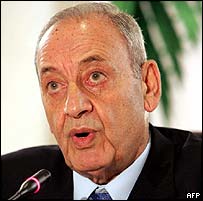 The Lebanese cabinet crisis persists even though Hizb Allah and Amal, the two principal Shia political groups, have affirmed in a joint statement their commitment to a deal recently reached with Saad al-Hariri, the leader of the anti-Syian Future bloc, Aljazeera reports.The deal recognises Hizb Allah’s armed resistance as legitimate as long as the Shebaa Farms remain occupied by Israel and Lebanese prisoners languish in Israeli jails.
The Lebanese cabinet crisis persists even though Hizb Allah and Amal, the two principal Shia political groups, have affirmed in a joint statement their commitment to a deal recently reached with Saad al-Hariri, the leader of the anti-Syian Future bloc, Aljazeera reports.The deal recognises Hizb Allah’s armed resistance as legitimate as long as the Shebaa Farms remain occupied by Israel and Lebanese prisoners languish in Israeli jails.
The announcement was made on Friday after a meeting of the leaders of the two pro-Syrian Shia political groups at Ein Al-Tineh in Beirut, the Lebanese capital.Aljazeera reported quoting Hizb Allah and Amal leaders that they were now awaiting the translation of the accord into concrete action.The two Shia groups have been boycotting the cabinet for days now over differences with the Future bloc and its allies for their approach to the assassinations of anti-Syrian personalities, especially former prime minister Rafiq al-Hariri.
Last Sunday, Fouad Siniora, the prime minister of Lebanon, held a meeting with the two groups as part of the attempt to break the political deadlock but without success.
Israeli violations
Meanwhile, the Lebanese armed forces has said two Israeli warplanes flew over Lebanon on Friday, violating the country’s airspace.
In a statement, the Lebanese armed forces said the Israeli planes entered Lebanon’s airspace, first flying to the south and then towards the north before returning.
The latest violation came just days after Israel bombarded suspected Hizb Allah targets in southern Lebanon.
|
|
Simon Peres, Israel’s Nobel prize-winning former prime minister, meanwhile, has described Hizb Allah as a "cancer" in Lebanon.
Peres told a meeting with students in Tel Aviv that Hizb Allah had pervaded and compromised all ranks of Lebanese government.
"Lebanon could have become independent. It is a prosperous country, with no enemies and with an internationally recognised border," Peres was quoted as saying in a statement from his office.
"Hizb Allah holds back Lebanon. It is a state within a state, an army within an army. It is like a cancer. Nobody wants it."
Peres’ remarks came as the Lebanese military said soldiers found and defused two Katyusha rockets primed to be launched at Israel from South Lebanon.
Border tension
Unidentified armed men had fired at least three Katyusha rockets on a town in northern Israel on Tuesday, wounding three people and prompting an Israeli retaliation.
In a rare rebuke, Siniora condemned the rocket attack and said his government would catch the perpetrators to make sure it did not happen again.
Sources said the Katyusha rockets were found at a citrus grove in the frontier town of Naqoura. It was not immediately clear who had prepared the two rockets.
Although it was not the first time that Lebanese soldiers had seized rockets in South Lebanon, Friday’s dismantling suggested the army was being more vigilant following Siniora’s remarks.
Furthermore, Aljazeera’s correspondent in Beirut said Lebanese security forces have arrested four Syrians with arms in the Bekaa Valley in South Lebanon.
The arrest came after an overnight clash.
The identity or names of the detained Syrians have not been disclosed, the correspondent said.
South Lebanon is largely controlled by Hizb Allah fighters who have sporadically clashed with Israeli forces since the Jewish state ended 22 years of occupation in 2000.
Hizb Allah has, however, denied any role in this week’s attack.
Russian denial
Russia, meanwhile, has rejected an Israeli claim that the Hizb Allah used Russian-made rockets that had been sold to Syria.
|
|
Israel’s Yediot Ahronot newspaper on Thursday quoted Israeli Major-General Aharon Zeevi-Farkash, the head of army intelligence, as saying Hizb Allah had used Russian-made rocket-propelled grenades purchased by Syria in two recent cross-border attacks into Israel.
"There are not and cannot be any grounds for this," Russian Foreign Ministry spokesman Mikhail Kamynin said in a statement on Friday.
"The system we have created for control of weapons exports is one of the strictest and most reliable," he said, adding that the system would not allow Russian weapons to reach unintended recipients.
Kamynin reiterated Russia’s commitment to promoting Israel’s security.



